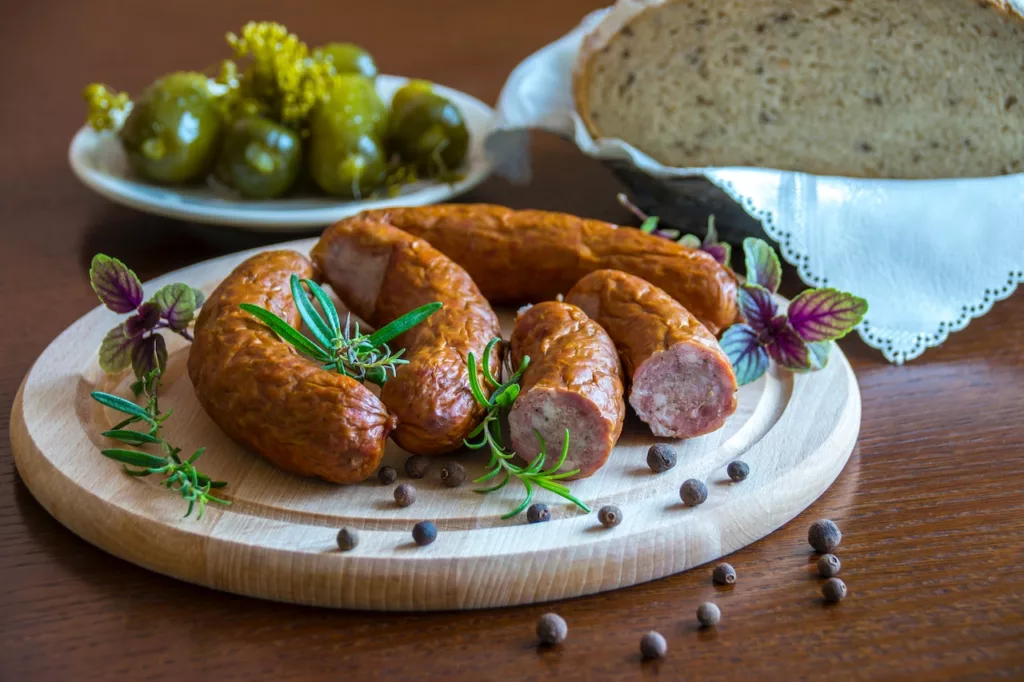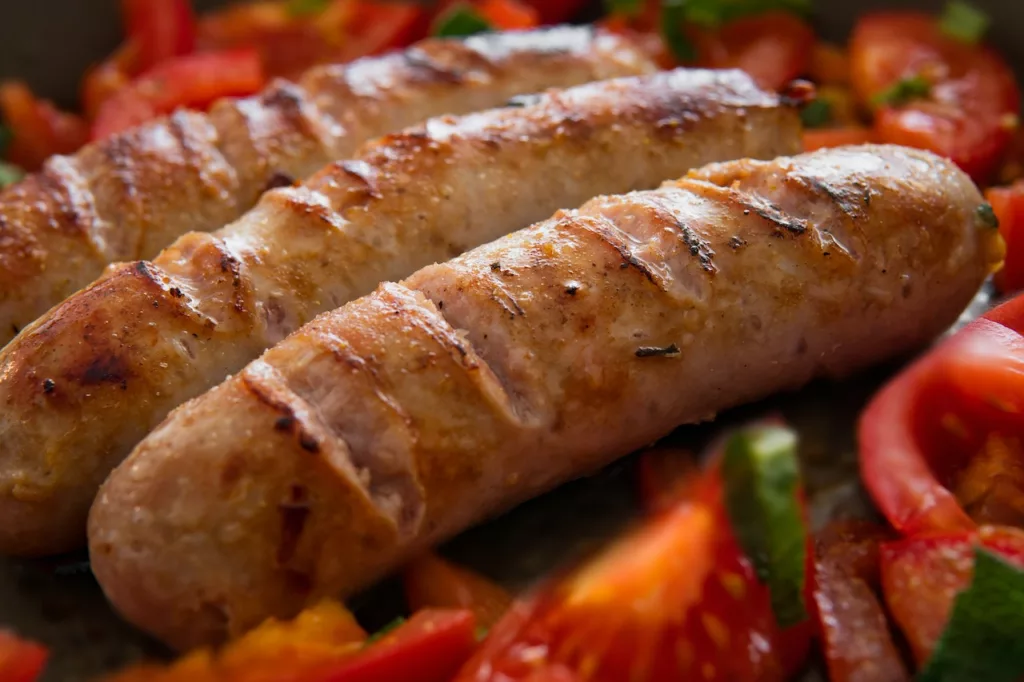It is important to ensure that any treats you give your dog while eating are healthy for them. Can dogs eat sausage? For instance, you should consider whether sausages are safe for dogs to consume without causing any detrimental health effects.
Table of Contents
Can dogs eat sausage?
Most professionals recommend against giving sausage to dogs, even though they may seem like a delicious and meaty treat. Sausages should not be part of a dog’s diet, and alternative meat or protein options can provide more nutritional benefits.

In moderation, dogs can eat small pieces of sausage occasionally.
Most dogs can tolerate the occasional small piece of sausage in their bowl. Nevertheless, it is not advisable to include sausages in their daily diet, no matter how much they beg for it. It is better to choose healthier treats that are equally delicious but more beneficial for your dog. Monitor dogs for potential side effects such as bloating, gas, diarrhea, or constipation.
Is sausage bad for dogs?
If you enjoy cooking sausages for breakfast, you may notice your dog eagerly eyeing your plate, hoping for a taste. However, experts do not recommend giving dogs a whole sausage or a large amount of sausage. Dogs should avoid eating raw sausage as it can cause salmonella.
The high-fat content in sausages is one of the main reasons they’re unhealthy for dogs. Breakfast sausages can lead to obesity, heart issues, pancreatitis, and diabetes.
In addition to being high in fat, sausages often have a high salt content and seasonings that are harmful to dogs. Some seasonings may even contain onions, which can be dangerous for dogs.
Avoid feeding your dogs Viennese sausages, as they are typically high in fat and salt. Instead, there are healthier options that dogs love and that won’t cause obesity or other heart problems when given in moderation.

Can dogs eat cooked sausage for breakfast?
Sausage breakfast is a great way to start the day. These could be the reasons why your dog begs for a bite when you’ve cooked sausages for breakfast. However, it’s important to remember that just because your dog wants something doesn’t mean you should give in and feed them.
Giving your dog sausage for breakfast is not a nutritious option. Although a small bite now and then won’t harm them, it won’t contribute to their overall health either. Note that dogs don’t require their link or patty; even a tiny bit of sausage would suffice.
However, if your pet’s begging is irresistible to you, ensure that you fully cook the sausage. Raw sausage may contain harmful bacteria like E. coli and salmonella, which could make your dog unwell.
Feeding sausage to your dog may seem harmless, but it’s important to keep in mind the potential health risks. Besides lacking nutritional value, sausages can be very high in fat, with some breakfast varieties containing up to 50% fat. This can lead to obesity and health problems in dogs over time.

My dog ate a lot of sausages: Now what?
Provide dogs with plenty of water if they experience diarrhea or vomiting after consuming fatty meats. Monitor symptoms closely and contact your vet for further advice.
You should give sausages and other fatty meats in moderation and only as occasional treats. Depending on the severity of their symptoms, your vet may recommend further treatment or suggest ways to help ease their discomfort.
Stick to a balanced and nutritious diet to avoid health issues. Making food with sausage fat
Avoid using bacon or sausage fat to cook eggs or other foods to protect your dog’s health. Note that fat can be harmful to dogs and should generally avoid it. To learn more, you can refer to our other article on whether dogs can eat bacon.
Types of sausages that dogs can eat or not.
Pork sausage is not recommended for dogs due to its seasonings. These seasonings can increase the risk of anemia in dogs. Additionally, pork sausage may be undercooked or toxic, which can be harmful. Even when well-cooked, it’s still a high-fat and high-salt food that’s not the healthiest option for your pet.
On the other hand, hot dogs, while often categorized as sausages, can be a suitable treat for dogs in moderation. High-quality meats like chicken or turkey make this especially true. However, it’s important to limit the intake of processed meats containing a lot of salt.
Beef sausage should be high-quality, free from harmful additives, and have lower fat content than pork. Make sure they are not seasoned with harmful additives. Beef is a common ingredient in dog food, so check the ingredient list before feeding it.
Chicken sausage can also be a healthy choice as long as it doesn’t contain harmful spices and additives. It can provide your dog with essential nutrients and make mealtime enjoyable. However, be sure to monitor the amount you feed and watch out for any digestive issues. If you notice any problems, stop feeding your dog sausage.
How to give sausages to my dog?
Determining the appropriate amount of sausages to give your dog depends on its size, weight, and level of physical activity. As a general rule, it is best to incorporate sausages into your dog’s diet occasionally, ideally once or twice a week, as part of a varied and balanced diet.
When selecting sausages for your dog, it is recommended to choose artisan sausages without spices. For the type of meat, chicken or turkey sausages are the best options, particularly for dogs that are obese or have low physical activity levels since they contain less fat than pork sausages.
Conclusion: Can dogs eat sausage?
Avoid pork sausage and sausages that contain harmful additives, but you can feed other types in moderation. Discuss any dietary changes with your vet. It is important to keep an eye on dogs for any adverse reactions to sausages.
Keep your dog away from pork sausage, which is high in fat and salt and may contain harmful seasonings. Undercooked or toxic sausage can also lead to serious illnesses in dogs, such as trichinosis.
Additionally, sausages that contain onion or garlic powder can be dangerous for dogs and may increase their risk of developing anemia. Feed your dog protein-rich foods that are safe and free from harmful additives.
Dogs can obtain good protein from meat, but it’s not recommended to feed them sausages and other salty foods. Even though sausages may be appetizing to humans, they can be too heavy for a dog’s digestive system.
Small amounts of sausage should be given to dogs, but not replaced with regular food. Doing so could cause nausea, diarrhea, or vomiting.
Article source: Dogs and sausage from the rover . Sausage Ingredients. Photos from Pexels